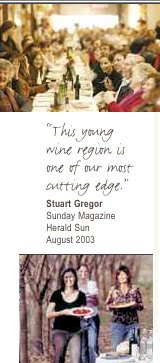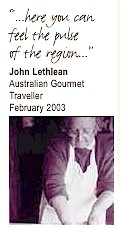


The four brothers and their families continued to grow tobacco together and progressively grew their business to eventually become the largest tobacco producing company in the southern hemisphere, which at one point was able to employ and support seventeen share farmers as well as the four brother's families.

In the 1970s the tobacco industry began to change in Australia as a quota system for the growing and sale of tobacco was being introduced. Over the next decade Alfred and his wife Katrina planted Chardonnay, Sauvignon Blanc, Cabernet Sauvignon, Merlot, Malbec and Shiraz, all of the fruit produced from these vines was sold to different winemaking companies around Australia.
Riesling was the first varietal planted in 1978, Chardonnay, Cabernet Sauvignon, Shiraz and Sauvignon Blanc followed soon after. In the late eighties Alfred began to experiment with the Italian varietals Sangiovese and Nebbiolo. After establishing that the King Valley's terroir was suited to Italian varietals Alfred planted Verduzzo, Arneis and Picolit.
Gary Crittenden founder of the wine label Dromana Estate was instrumental in helping Alfred source some Sangiovese stock for the vineyard. In 1994 Alfred and Katrina introduced the Pizzini wine label with the inaugural release of a Chardonnay. Initially the wine was made by John Ellis of Hanging Rock, but over time Alfred choose to bring the winemaking back to the King Valley. Now the wines are made by Joel Pizzini, Alfred and Katrina's son. Joel has studied winemaking at Charles Sturt University in Wagga Wagga, and has completed three vintages in the Piemonte and Tuscany regions of Italy.

Pizzini Wines exists as an Italianate Australian identity, based around the passions and commitment to family heritage, hard work and determination. Alfred and Katrina Pizzini's vision was to establish a winery that consistently delivers the finest Italian styles, in combination with strong King Valley regionality. Today, winemaker Alfred Pizzini endeavours on a daily basis to be the leading producer of fine Italian varietals. With twenty five years of hands-on viticultural, fashioning complex and serious wines, Pizzini aims to strike the better balance between number of vines per hectare, type of trellising, soil types and land aspects, to ensure the vineyards produce mature fruit, with maximum concentration of flavours.
Alfred knows his vineyard back-to-front, he says it's one of the most important aspects to making a good wine. Being able to grow and select the right fruit to make a particular wine style is as important as the viniculture itself. Over the past couple of years Alfred has enlisted the services of Alberto Antonini, a world travelling consultant winemaker and viticulturist specialising in the making of Italian style wines. Alberto guides Alfred and Joel with viticultural advice and blending to help make the style of wines Alfred wants to produce.
New vineyard developments at Pizzini are researched and planned with greater emphasis placed on site selection, clone planting regimes and vine trellising. The aim is to strike better balance between number of vines per hectare, type of trellising, soil types and land aspect so that the vineyard is better able to produce mature fruit with concentrated flavours. Experimentation with clones, the continual search for the perfect oak to suit each wine style, and Alfred's passion for Italian styled wines, are all keystones to ensuring Pizzini remains a leader in the production of fine Italian varietal wines.
